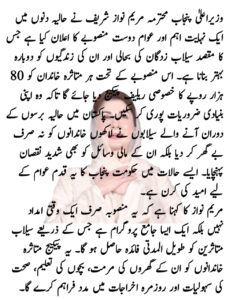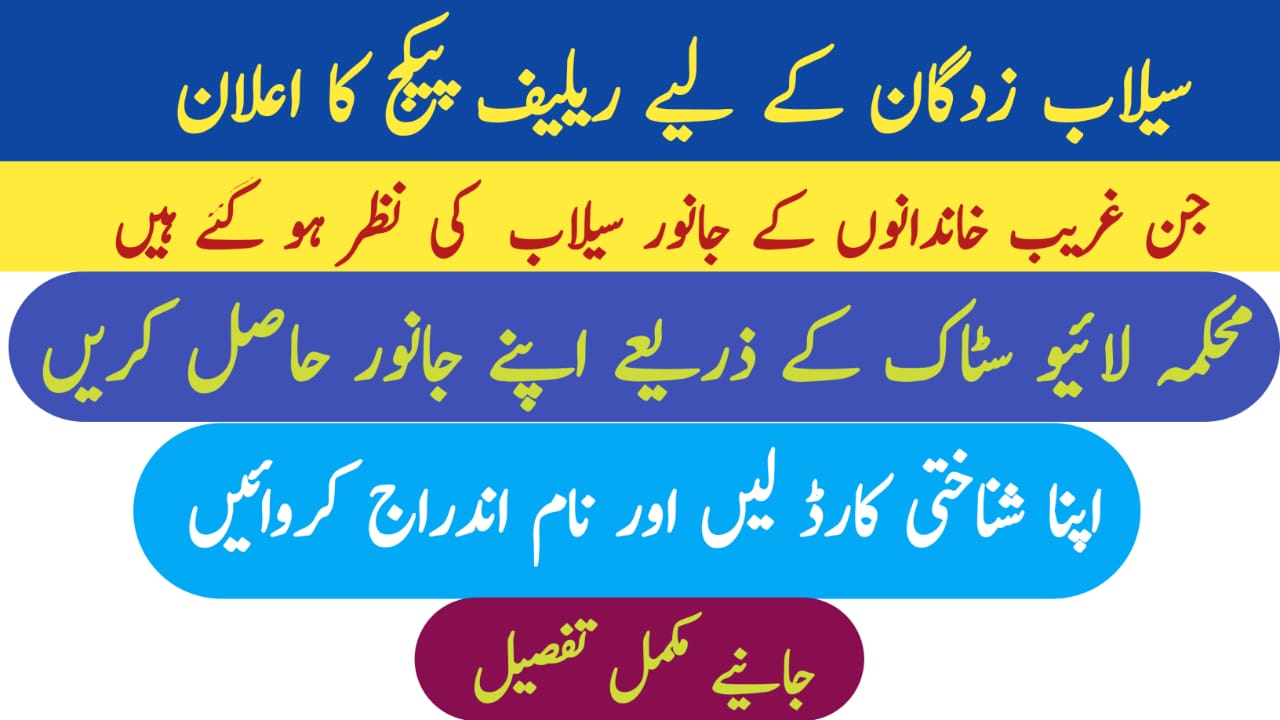In the rapidly Maryam Nawaz Flood Relief evolving political and economic landscape of Pakistan, welfare programs have become essential for social stability and development. Over the past few years, governments have introduced several initiatives aimed at empowering youth, reducing poverty, and enhancing education and healthcare. Among the prominent leaders playing a significant role in this sphere is Maryam Nawaz, the Chief Minister of Punjab and a prominent figure of the Pakistan Muslim League-Nawaz (PML-N).
The Maryam Nawaz Flood Relief Scheme is widely recognized for its focus on women’s empowerment, youth employment, rural development, and education reforms. Unlike short-term relief packages that provide temporary solutions, her programs emphasize sustainable development—helping individuals not just to survive but to thrive. She firmly believes that empowering young people and women is the key to building a stronger Pakistan.
The year 2025 marks an important milestone in her leadership journey, as she has announced multiple schemes aimed at different segments of society. These include youth loan programs, women entrepreneurship initiatives, digital skill training, healthcare support, rural economic revival projects, and scholarships for students. Together, these initiatives reflect her vision of an inclusive and prosperous Pakistan.
This article will provide a detailed overview of Maryam Nawaz’s schemes and programs in 2025, including their objectives, eligibility criteria, application process, benefits, challenges, and impact on Pakistan’s future.
Objectives of Maryam Nawaz Flood Relief Scheme
Maryam Nawaz’s programs are designed with a clear mission to uplift the underprivileged and strengthen Pakistan’s economy. The key objectives include:
- Youth Empowerment: To provide young people with financial and skill-based support so they can create self-employment opportunities.
- Women’s Inclusion: To promote gender equality by encouraging women’s active participation in business and the workforce.
- Educational Access: To ensure that no child or talented student is deprived of education due to financial constraints.
- Healthcare for All: To make healthcare affordable and accessible to low-income families.
- Rural Economic Growth: To improve the livelihoods of farmers and rural households through subsidies and livestock support.
- Digital Advancement: To prepare Pakistani youth for the global digital economy with IT and freelancing skills.
Maryam Nawaz Flood Relief Scheme in 2025
Youth Loan and Entrepreneurship Scheme
The Maryam Nawaz Youth Loan Scheme 2025 is one of the most impactful initiatives introduced this year. It aims to reduce unemployment by helping young people start their own businesses.
- Loans ranging from PKR 100,000 to PKR 2 million.
- Interest-free or low-interest repayment plans.
- Support for startups in agriculture, IT, retail, and services.
- Training programs in entrepreneurship and financial literacy.
This program not only encourages self-employment but also contributes to Pakistan’s economic growth by fostering innovation and entrepreneurship.

Women Empowerment Programs
Recognizing the challenges faced by women in Pakistan, Maryam Nawaz has launched dedicated schemes to promote gender equality.
- Small Business Loans: Financial support for women-led businesses.
- Skill Training Centers: Tailoring, handicrafts, digital freelancing, and e-commerce training.
- Special Grants: For widows, divorced women, and single mothers.
- Support Services: Legal aid and psychological counseling for women facing workplace challenges.
This initiative empowers women to become financially independent and active contributors to their families and communities.
Education Scholarships and Stipends
Education is a top priority in Maryam Nawaz’s welfare agenda. The scholarship and stipend programs provide:
- Full scholarships for students from low-income families.
- Monthly stipends for female students in rural areas to reduce dropout rates.
- Partnerships with universities for higher education and research funding.
- Digital literacy training for school students to prepare them for the modern economy.
This ensures that financial barriers do not prevent deserving students from pursuing education.
Healthcare Programs and Health Insurance
Access to quality healthcare remains a challenge in Pakistan, especially in rural areas. Maryam Nawaz’s healthcare initiatives aim to address this gap:
- Free health insurance cards for families under the poverty line.
- Mobile health units in remote villages.
- Subsidized medicines and free medical check-ups at government hospitals.
- Programs focused on maternal and child health.
This scheme provides a safety net for families who otherwise cannot afford medical expenses.
Skill Development and IT Training
With freelancing and digital jobs on the rise, Maryam Nawaz has introduced skill development programs to bridge the digital divide.
- Free courses in IT, freelancing, and e-commerce.
- Training in graphic design, digital marketing, and software development.
- International freelancing certifications for Pakistani youth.
- Job placement services and career counseling.
This prepares Pakistan’s youth to compete in the global job market and earn sustainable incomes.
Rural Development and Farmer Support
Agriculture is the backbone of Pakistan’s economy. Maryam Nawaz has introduced reforms to uplift rural households:
- Subsidies on seeds, fertilizers, and farming equipment.
- Modern training for farmers on sustainable agricultural practices.
- Livestock distribution programs for poor rural families.
- Micro-financing options for small farmers.
These measures strengthen rural communities and ensure food security.
Eligibility Criteria for Maryam Nawaz Flood Relief Scheme
Most of Maryam Nawaz’s programs have simple eligibility requirements to maximize participation:
- Applicants must be Pakistani citizens with a valid CNIC.
- Youth loans: Age between 18 and 35 years with a viable business plan.
- Women’s programs: Women from underprivileged backgrounds.
- Scholarships: Students enrolled in recognized institutions with financial need.
- Healthcare support: Families listed in the poverty scorecard or registered with BISP.
How to Apply for Maryam Nawaz Flood Relief Scheme
- Online Application: Submit applications through official government portals.
- District Centers: Manual application submission at local offices.
- Verification: CNIC verification via NADRA.
- Biometric Confirmation: For loans and financial aid.
- Disbursement: Direct provision of loans, scholarships, or healthcare services.
Benefits of Maryam Nawaz Flood Relief Scheme
- Employment Growth: Youth loans reduce unemployment.
- Gender Equality: Women’s financial independence strengthens families.
- Educational Access: More students can complete higher education.
- Healthcare Security: Poor families receive essential medical care.
- Rural Stability: Farmers and rural households enjoy better income opportunities.
- Digital Economy Growth: IT training connects Pakistan’s youth with global markets.
Challenges
Despite the positive outlook, some challenges remain:
- Awareness gaps in rural and remote areas.
- Risk of delays in loan disbursements.
- Need for stronger monitoring to ensure transparency.
- Limited resources compared to demand.
FAQs
Q1: Who can apply for Maryam Nawaz’s Youth Loan Scheme?
Pakistani citizens aged 18–35 with a valid CNIC and a business idea.
Q2: Are women given separate opportunities?
Yes, women have access to dedicated small loans, grants, and training centers.
Q3: How do students benefit?
Through scholarships, stipends, and digital literacy programs.
Q4: Is healthcare support free?
Yes, families below the poverty line receive free health insurance and treatment.
Q5: Are the programs Punjab-only?
Most programs are Punjab-based, but some scholarships and IT programs are nationwide.
Conclusion
The Maryam Nawaz Schemes and Programs 2025 highlight a vision for an inclusive and empowered Pakistan. By focusing on youth, women, education, healthcare, IT training, and rural development, Maryam Nawaz is addressing both immediate needs and long-term challenges.
These initiatives go beyond temporary relief by offering sustainable solutions that create jobs, reduce poverty, and enhance social inclusion. If implemented with transparency and consistency, they can transform the lives of millions of Pakistanis and contribute to a more prosperous nation.
For More Information, Click Here
